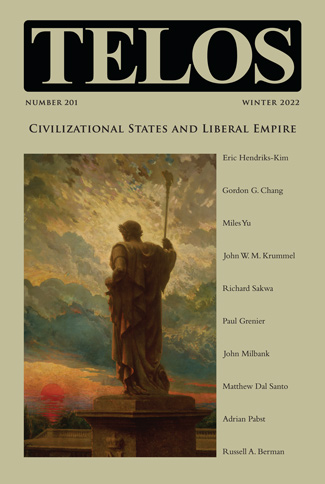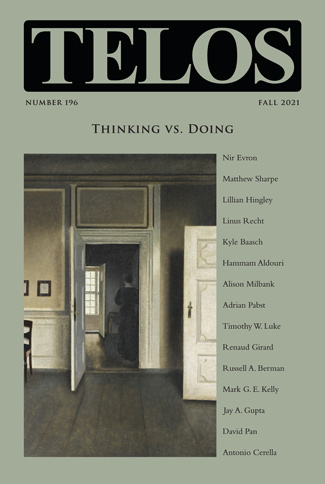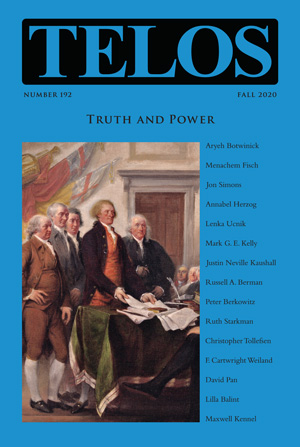By David Pan · Friday, October 13, 2023  Hamas’s horrifying attack on Israeli civilians is a continuation of terrorist methods that it has been using for years against Israel. As a technique of war, its terrorism functions primarily as a way of gaining support from current and potential allies. Such a massacre can only serve Hamas’s war aims to the extent that the use of terror as a technique of war points to an ideological similarity with its allies, Iran and Hezbollah. Hamas’s use of terror only makes sense because the allies it is trying to convince—anti-Semitic populations and terrorists in the Arab world as well as totalitarians everywhere—share their disregard for principles of human rights as well as their use of fear and hatred as the primary determiners of political life. Terrorism only works for Hamas insofar as it can appeal to similar inclinations in others in order to build a broader alliance of terrorist movements and totalitarian states. Hamas’s horrifying attack on Israeli civilians is a continuation of terrorist methods that it has been using for years against Israel. As a technique of war, its terrorism functions primarily as a way of gaining support from current and potential allies. Such a massacre can only serve Hamas’s war aims to the extent that the use of terror as a technique of war points to an ideological similarity with its allies, Iran and Hezbollah. Hamas’s use of terror only makes sense because the allies it is trying to convince—anti-Semitic populations and terrorists in the Arab world as well as totalitarians everywhere—share their disregard for principles of human rights as well as their use of fear and hatred as the primary determiners of political life. Terrorism only works for Hamas insofar as it can appeal to similar inclinations in others in order to build a broader alliance of terrorist movements and totalitarian states.
This terrorist approach to politics defines the asymmetry in the conflict between Hamas and Israel. In contrast to Hamas, Israel and its main ally, the United States, are committed to protecting human rights, even in the face of terrorist enemies. Without such self-control, Israel could destroy Hamas by conducting the same kind of indiscriminate killing of Palestinians that Hamas has used against Israel. There is no doubt that if Hamas had the means at its disposal, it would not hesitate to kill the entire population of Israel. But in eschewing such terrorist methods, Israel ends up being attacked for its failures to live up to the human rights principles that it espouses. In its commentary on the conflict, Human Rights Watch focuses primarily on the Israeli siege of Gaza as a war crime while treating Hamas’s massacres of Israelis merely as the work of “individuals” who “should be brought to justice.”[1] Perversely, Israel loses legitimacy due to its general support for human rights, even as it struggles to balance a respect for human rights with its need to fight for its existence against the terrorists and totalitarians that surround it. Meanwhile, Hamas is not considered to be the political leadership of Gaza but as a set of bad individuals to be differentiated from the Gazan population. Clearly, Hamas’s use of Palestinians as human shields indicates how its terrorism translates into totalitarian rule within Gaza. Yet to treat the Palestinians as victims and Hamas as a few bad individuals ignores the political reality that Hamas constitutes the elected political authority of Gaza and recruits its fighters from the Gazan population that supports it.
Continue reading →
By David Pan · Monday, January 16, 2023 Telos 201 (Winter 2022): Civilizational States and Liberal Empire is now available for purchase in our store. Individual subscriptions to Telos are also available in both print and online formats.
 In concluding that “All political action has then in itself a directedness towards knowledge of the good: of the good life, or of the good society,” Leo Strauss describes an essential link between power and values. Because the power to make decisions about our future cannot be separated from the fundamental goals and ultimate meaning of our lives, we cannot exercise power that would be divorced from some set of values. Even the narrowest understanding of self-interest must come to terms with one’s own mortality and the meaning of others for our own existence. Consequently, raw power does not exist, as it can only be exercised within some understanding of its purposes. In concluding that “All political action has then in itself a directedness towards knowledge of the good: of the good life, or of the good society,” Leo Strauss describes an essential link between power and values. Because the power to make decisions about our future cannot be separated from the fundamental goals and ultimate meaning of our lives, we cannot exercise power that would be divorced from some set of values. Even the narrowest understanding of self-interest must come to terms with one’s own mortality and the meaning of others for our own existence. Consequently, raw power does not exist, as it can only be exercised within some understanding of its purposes.
When we consider the way in which power functions on a global level, it will also be crucial to understand how a world order will reflect a particular way of structuring the relationship between values and power. Even the seemingly most egregious use of power can only take place within the framework of an attempt to realize values in the world, and realist accounts of global order must also recognize the importance of some ideology such as nationalism as a means of establishing political values. Accordingly, discussions of balance-of-power dynamics can only begin once great powers emerge as a consequence of the political will of certain peoples to understand themselves in a certain way. Based on such measures as GDP, population, and military spending, Russia does not rank particularly well in relation to countries such as Brazil and India, neither of which pretends to great power status. If Russia can be considered a great power today, it is primarily because of the goals and values that its government embodies. Values form the foundations of global order, and Russia only continues to project its power because it maintains a sense of the global reach of its values for determining order for others.
Continue reading →
By Telos Press · Monday, July 25, 2022 In today’s episode of the Telos Press Podcast, David Pan talks with Mark G.E. Kelly and Timothy W. Luke about the Russian invasion of Ukraine and its consequences for world order. Our current issue, Telos 199 (Summer 2022), features essays by Luke, Kelly, and Pan on the war in Ukraine, excerpts of which appear here. Click through to read the full articles at the Telos Online website (subscription required). To learn how your university can subscribe to Telos, visit our library recommendation page. Print copies of Telos 199 are also available for purchase in our online store.
Continue reading →
By David Pan · Monday, September 20, 2021 Telos 196 (Fall 2021): Thinking vs. Doing is now available for purchase in our store. Individual subscriptions to Telos are also available in both print and online formats.
 The dichotomy of thinking versus doing seems to arise out of our own sense of the difference between our minds and our bodies. On the one hand, the gap between mind and body is the basis of the perspective with which the mind can step back, criticize, and improve the world. Without this gap, we would be trapped in an eternal present, unable to imagine anything but what currently exists. On the other hand, the dichotomy can lead to a sense of detachment from the world. Such detachment can be negative if it leads to an isolation from the world, or to a sense of alienation if the world is such that its influence on the body becomes oppressive for the mind. The opposition between thinking and doing directs our attention toward this fundamental gap between the mind and the body within the human condition that is the source of both all human achievement as well as human debasement. As we focus on thinking, our detachment from our actions can allow us to make judgments about the wisdom of our actions, but such detachment can also lead us to bury ourselves in contemplation and ignore our responsibilities for acting, or even allow us to act with a kind of cruel coldness in trying to realize an abstract idea. This issue of Telos considers such different possibilities for the way in which we relate our thinking to our actions. The dichotomy of thinking versus doing seems to arise out of our own sense of the difference between our minds and our bodies. On the one hand, the gap between mind and body is the basis of the perspective with which the mind can step back, criticize, and improve the world. Without this gap, we would be trapped in an eternal present, unable to imagine anything but what currently exists. On the other hand, the dichotomy can lead to a sense of detachment from the world. Such detachment can be negative if it leads to an isolation from the world, or to a sense of alienation if the world is such that its influence on the body becomes oppressive for the mind. The opposition between thinking and doing directs our attention toward this fundamental gap between the mind and the body within the human condition that is the source of both all human achievement as well as human debasement. As we focus on thinking, our detachment from our actions can allow us to make judgments about the wisdom of our actions, but such detachment can also lead us to bury ourselves in contemplation and ignore our responsibilities for acting, or even allow us to act with a kind of cruel coldness in trying to realize an abstract idea. This issue of Telos considers such different possibilities for the way in which we relate our thinking to our actions.
Continue reading →
By Telos Press · Saturday, September 11, 2021 Telos Zoom Discussion
September 18, 2021
4 pm to 6 pm U.S. Eastern time
Join Telos editors Mark Kelly, Tim Luke, Adrian Pabst, Marcia Pally, David Pan, and David Westbrook for a discussion of the causes of the U.S. failure in Afghanistan and the long-term consequences.
To attend, register here:
https://uci.zoom.us/meeting/register/tJMpf-ivqjMrEtVVTMSia1pfo_L9E2H-bwwk
We look forward to seeing you there.
Continue reading →
By Aryeh Botwinick · Friday, November 13, 2020 Aryeh Botwinick’s “Negative Theology, Power, and the Israeli–Palestinian Conflict” appears in Telos 192 (Fall 2020): Truth and Power. Read the full article at the Telos Online website, or purchase a print copy of the issue in our online store. Individual subscriptions to Telos are available in both print and online formats.
 From a Machiavellian perspective, peace is war by other means. You can have a much greater watchful vigilance of your former (or future) opponent in times of peace than in a time of war. Israel as a sponsor (or co-sponsor) of a kind of Middle East Marshall Plan: Rebuilding your enemy so that he becomes your ally and friend. Enemies must learn to use each other’s weapons. The weakness of the Palestinians has to be matched by the deliberate, self-consciously generated weakness of the Israelis in the form of benevolence and generosity in order for both sides to emerge as triumphant. If this approach is pursued, the Israeli–Palestinian conflict harbors the prospect of turning into a sum-sum conflict, where both sides stand equally to gain by pursuing peace. From a Machiavellian perspective, peace is war by other means. You can have a much greater watchful vigilance of your former (or future) opponent in times of peace than in a time of war. Israel as a sponsor (or co-sponsor) of a kind of Middle East Marshall Plan: Rebuilding your enemy so that he becomes your ally and friend. Enemies must learn to use each other’s weapons. The weakness of the Palestinians has to be matched by the deliberate, self-consciously generated weakness of the Israelis in the form of benevolence and generosity in order for both sides to emerge as triumphant. If this approach is pursued, the Israeli–Palestinian conflict harbors the prospect of turning into a sum-sum conflict, where both sides stand equally to gain by pursuing peace.
Continue reading →
|
|
 Hamas’s horrifying attack on Israeli civilians is a continuation of terrorist methods that it has been using for years against Israel. As a technique of war, its terrorism functions primarily as a way of gaining support from current and potential allies. Such a massacre can only serve Hamas’s war aims to the extent that the use of terror as a technique of war points to an ideological similarity with its allies, Iran and Hezbollah. Hamas’s use of terror only makes sense because the allies it is trying to convince—anti-Semitic populations and terrorists in the Arab world as well as totalitarians everywhere—share their disregard for principles of human rights as well as their use of fear and hatred as the primary determiners of political life. Terrorism only works for Hamas insofar as it can appeal to similar inclinations in others in order to build a broader alliance of terrorist movements and totalitarian states.
Hamas’s horrifying attack on Israeli civilians is a continuation of terrorist methods that it has been using for years against Israel. As a technique of war, its terrorism functions primarily as a way of gaining support from current and potential allies. Such a massacre can only serve Hamas’s war aims to the extent that the use of terror as a technique of war points to an ideological similarity with its allies, Iran and Hezbollah. Hamas’s use of terror only makes sense because the allies it is trying to convince—anti-Semitic populations and terrorists in the Arab world as well as totalitarians everywhere—share their disregard for principles of human rights as well as their use of fear and hatred as the primary determiners of political life. Terrorism only works for Hamas insofar as it can appeal to similar inclinations in others in order to build a broader alliance of terrorist movements and totalitarian states. 




